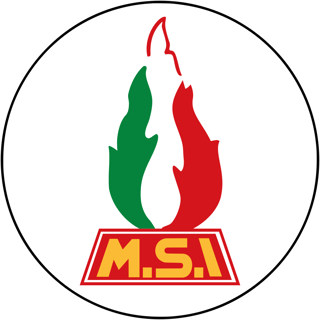The Italian Social Movement (Italian: Movimento Sociale Italiano, MSI) was a neo-fascist political party in Italy. A far-right party, it presented itself until the 1990s as the defender of Italian fascism's legacy, and later moved towards national conservatism. In 1972, the Italian Democratic Party of Monarchist Unity was merged into the MSI and the party's official name was changed to Italian Social Movement – National Right (Italian: Movimento Sociale Italiano – Destra Nazionale, MSI–DN). Formed in 1946 by supporters of the former dictator Benito Mussolini, most of whom took part in the experience of the Italian Social Republic and the Republican Fascist Party, the MSI became the fourth largest party in Italy by the early 1960s. The party gave informal local and eventually national support to the Christian Democracy party from the late 1940s and through the 1950s, sharing anti-communism. In the early 1960s, the party was pushed to the sidelines of Italian politics, and only gradually started to gain some political recognition in the 1980s. There was internal competition between the party's moderate and radical factions. The radicals led the party in its formative years under Giorgio Almirante, while the moderates gained control in the 1950s and 1960s. Almirante's return as leader in 1969 was characterised by a big tent strategy. In 1987, the reins of the party were taken by Gianfranco Fini, under whom it was transformed in 1995 into National Alliance (AN), a post-fascist party. On that occasion a small minority, led by Pino Rauti, disagreed with the new course and formed Tricolour Flame instead. In 2009, AN merged with the then centre-right main party, The People of Freedom (PdL), while Brothers of Italy was founded in 2012 as a right-wing split of the PdL, and ten years later it became the largest party in the country. From Wikipedia
